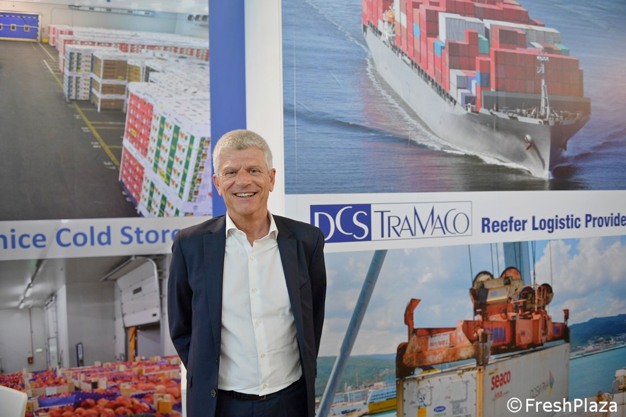The year 2025 is expected to bring many changes to the global shipping scenario. Riccardo Martini, managing director of DCS Tramaco, an international transport company specialising in refrigerated shipping, explains what could happen in the coming months.
"At the beginning of 2025," says Martini, "the main alliances in the container transport sector will be under review and this will obviously have an impact, hopefully a positive one, also on the transport of perishable products. So let's have a look at the main changes, the most important of which will be the dissolution of the 2M alliance between MSC and Maersk in February."
 Riccardo Martini
Riccardo Martini
"MSC, the carrier with the largest hold capacity and the largest number of ships, will operate the East-West routes independently. For the Asia-Europe routes, it has formed a partnership with The Alliance, an entity from which Hapag-Lloyd has withdrawn and within which ONE, Yang Ming and HMM remain. The alliance is set to change its name to Premier Alliance. Finally, MSC signed a three-year cooperation agreement with ZIM for transpacific routes. Maersk and Hapag-Lloyd, which have departed from their previous alliances, have established The Gemini Cooperation, a partnership that is likely to challenge MSC and the other alliances on global routes. CMA, Cosco and Evergreen, on the other hand, have extended the duration of their partnership, The Ocean Alliance, until 2032."
The emergence of these new alliances will lead to a rebalancing of existing structures. "There should be the option to choose the most appropriate system for the traffic concerned," explains Martini. "To illustrate this point, consider the two main forces in the sector, MSC and Gemini Cooperation. These companies have based their future services on two very different philosophies. MSC has decided to add ports to its services, in the belief that the increasing fragmentation of global logistics chains will reward operators able to offer direct maritime connections, which for MSC is as important as the speed of the service."
"This is exemplified by the Asia-North Europe routes, where MSC will reach12 Asian and 13 European ports, in comparison to 9 and 7 for its closest competitor, Gemini Cooperation. This alliance has, in fact, adopted an opposing strategy, reducing the number of ports serviced by the main vessel and implementing a hub-and-spoke model, which has resulted in a 45% increase in transhipment cargo. According to Gemini's partners, the new system is expected to reduce transit times between the main service ports while maintaining a high level of service at the secondary ports, which are served by more rapid shuttles and regional feeder vessels. Gemini's objective is to achieve 90% punctuality. They believe that by reducing the number of ports on the main service, they can minimise the knock-on effects that congestion, strikes and other issues currently have on the system."
"Given the current situation, it is crucial to assess the potential for Suez Canal connections, which play a significant role in the transportation of fruits and vegetables between Europe and the Middle East and Far East. Alliances had assumed that there would be connections via Suez as well as via the Cape of Good Hope when presenting their respective services. Unfortunately, the issues affecting the Suez Canal, which have existed for over a year, have not been resolved. Apart from CMA with the Ocean Alliance, which uses the canal with a few services, MSC, Gemini and other alliances have suspended their planned connections through the Suez Canal."
"The current situation is having an unfortunate impact on European fruit exports in general, but particularly on Italian exports, which were particularly well-positioned to benefit from the Suez route. The substantial rise in transit times, coupled with the simultaneous increase in freight rates, has resulted in a notable decline in exports to some established markets. The latest figures from the producer associations demonstrate a considerable decline in fruit exports to the Far East, the Middle East, and India."
It goes without saying that DCS Tramaco has its own strategy within the scenarios we have just described. The CEO concludes: "As always, we'll continue to listen to the needs of our export customers and try to offer the most appropriate, safe and affordable solution. It is also important for us to put in place agile processes so that we can respond quickly to changes in the market or to peaks in demand. Exploring on-demand transport services for areas that are now more difficult to reach, using alternative means or systems, with our logistics partners is our daily mission. For instance, the use of controlled atmosphere containers to guarantee quality during long transit periods, and multi-modal transport to the Middle East, where the container is shipped from Italy to a port in the eastern Mediterranean before being transported by road to the final destination, saving time compared to transit via the the Cape of Good Hope."
For more information:![]()
DCS Tramaco
Ravenna - Italy
Tel.: +39 0544 426711
[email protected]
www.tramaco.net
